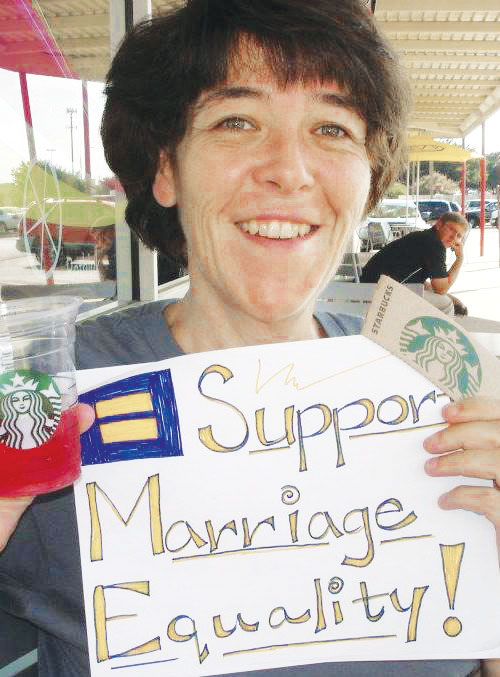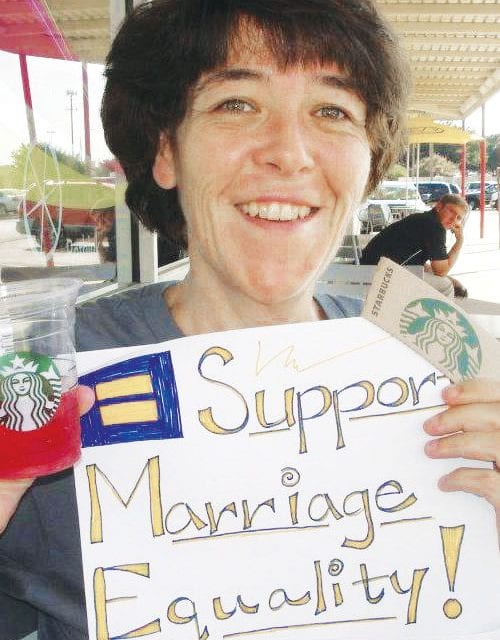Waco enacted employment nondiscrimination for city employees and the city manager hasn’t even received a phone call about it

GETTING IT RIGHT | Carmen Saenz is one of Waco’s LGBT activists who’s spent the past few years talking to religious leaders and other groups to lay the groundwork for this week’s adoption of an inclusive employment policy for city employees. (Photo courtesy of Carmen Saenz)
DAVID TAFFET | Staff Writer
taffet@dallasvoice.com
Police continue to guard the mayor of Houston because she received death threats after passage of a nondiscrimination ordinance last week. In Waco, however, a measure to protect LGBT city employees passed this week with little notice.
City Manager Dale Fisseler made an administrative change to Waco’s employment policy, adding sexual orientation and gender identity to other protected categories.
“All I’m doing is updating our internal policy … just to clarify that we don’t discriminate based on sexual preference and identity,” Fisseler said.
Fisseler has been city manager since March. In 2011, he became Waco deputy city manager. Although he was raised in Waco, he began working for Fort Worth in 1990 and became Fort Worth City Manager in 2007.
Waco Public Information Officer Larry Holze said the change does not need to go before city council, but the council was briefed on the policy in executive session.
When the policy was announced in the Waco Tribune Herald on Monday, Holze said he expected to be flooded with phone calls.
“There’s been no outcry from the public,” he said. “No calls.” He said he hasn’t even received other calls from media outlets other than Dallas Voice.
Last summer, the city’s Equal Employment Opportunity Advisory Committee recommended the change. The former city manager rejected the suggestion because he said the city had never had a complaint from an LGBT employee. He wrote to the committee that current policy discrimination and harassment are not allowed, irrespective of whether a category is on the protected list.
Fisseler said he based his action on additional information after talking to people in the LGBT community.
Carmen Saenz is among the city’s LGBT activists who has been working to have the policy changed. She said the additional information Fisseler referred to were stories of city employees going to work in fear that they’d lose their jobs if they came out at the city.
Saenz said she and other Waco LGBT community members have been laying the groundwork for this change in policy for two years. She said she’s been speaking to religious groups and organizations such as the NAACP.
“We’ve been explaining and educating,” she said. “We worked so hard addressing concerns and allaying fears.”
She always made the story personal, explaining that even if there were differences in beliefs, “I still had a right to go to work and I had a right to have a place to live.”
Dallas Gay and Lesbian Alliance President Patti Fink, who was graduated from Baylor University in Waco, said, “People of Waco are more progressive than people on the Baylor campus.” Fink said she thought many conservative people find firing people based on anything but job performance distasteful, and she complimented Fisseler.
“It’s awesome when a city employee can take care of it when they’re empowered to do so,” she said.
FInk opined that the difference between Waco and Houston was more than just the scope of Houston’s ordinance. She said the ordeal with Houston’s ordinance was pure politics.
“People are upset with the momentum in marriage equality and are striking out where they can,” she said.
Resource Center spokesman Rafael McDonnell agreed that Baylor is a conservative campus, but said some even more conservative ones bring in diverse ideas.
McDonnell was in Houston for the final debate and vote for HERO, the Houston Equal Rights Ordinance.
“I was stunned by the vehemence of the opposition,” he said.”I felt like I was in a bit of a time warp.”
With people outside Houston City Hall chanting, he said the scene reminded him of the ugliness in Dallas when Micah England was applying to become a police officer 25 years ago.
McDonnell said part of the difference is because the Waco policy wasn’t as broad as HERO.
In Waco, the issue was handled as a simple employment issue.
Holze summed up the decision by saying court decisions were all moving in the direction of nondiscrimination being extended to the LGBT community.
“It was eventually going to happen,” he said. “It was just the right thing to do.”
This article appeared in the Dallas Voice print edition June 6, 2014.
















